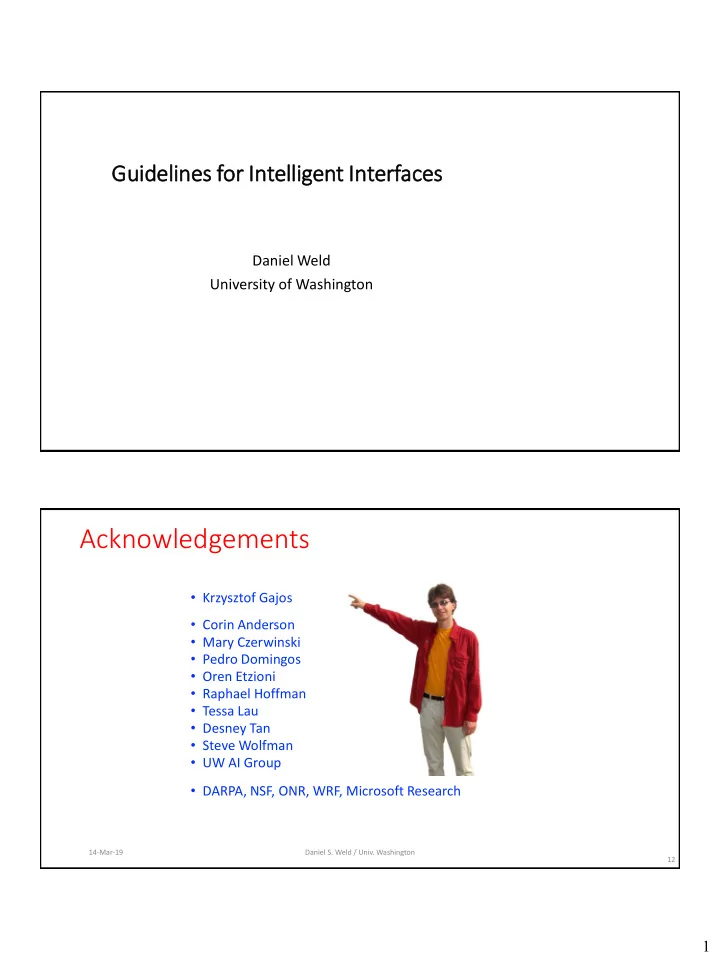

Gu Guid idelines for or In Intellig igent t In Interfaces Daniel Weld University of Washington Acknowledgements • Krzysztof Gajos • Corin Anderson • Mary Czerwinski • Pedro Domingos • Oren Etzioni • Raphael Hoffman • Tessa Lau • Desney Tan • Steve Wolfman • UW AI Group • DARPA, NSF, ONR, WRF, Microsoft Research 14-Mar-19 Daniel S. Weld / Univ. Washington 12 1
Early Adaptation: Mitchell,Maes • Predict: Email message priorities Meeting locations, durations Principle 1: Defaults minimize cost of errors Principle 2: Allow users to adjust thresholds 14-Mar-19 Daniel S. Weld / Univ. Washington 21 Adaptation in Lookout: Horvitz 14-Mar-19 Daniel S. Weld / Univ. Washington 22 Adapted from Horvitz 2
Adaptation in Lookout: Horvitz 14-Mar-19 Daniel S. Weld / Univ. Washington 23 Resulting Principles [Horvitz CHI-99 ] • Decision-Theoretic Framework • Graceful degradation of service precision • Use dialogs to disambiguate (Considering cost of user time, attention) 14-Mar-19 Daniel S. Weld / Univ. Washington 24 Adapted from Horvitz 3
Horvitz <-> POMDP? • What’s Shared? • Policy mapping from belief state to action • Idea of maximizing utility • What’s Different? • No model of state transition • No lookahead or notion of time • Greedy policy 25 Principles About Invocation Allow efficient invocation, correction & dismissal Timeouts minimize cost of prediction errors 14-Mar-19 Daniel S. Weld / Univ. Washington 26 4
20 Year Retrospective • More guidelines • https://medium.com/microsoft-design/guidelines-for-human-ai- interaction-9aa1535d72b9 27 14-Mar-19 Daniel S. Weld / Univ. Washington Human-AI Teams • Environment gives percept • AI makes recommendation [+ explanation] • Human decides whether to • Trust AI’s advice, or • Get more info and decide herself • Reward based on speed/accuracy 5
fied. “two-sided”: classifier Updates in Human-AI Teams satisfied. fix classifier’ • Environment gives percept • AI makes recommendation [+ explanation] Gagan Bansal fix • Human decides whether to Besa Nushi • Trust AI’s advice, or classifier Ece Kamar • Get more info and decide herself Walter Lasecki • Reward based on speed/accuracy Eric Horvitz first type– [Bansal et al. AAAI19] classifier classifier classifier Many ML Algorithms aren’t Stable wrt Updates Classifier Dataset ROC h 1 ROC h 2 CS LR Recidivism 0.68 0.72 0.74 Credit Risk 0.72 0.77 0.68 Mortality 0.68 0.77 0.54 MLP Recidivism 0.59 0.73 0.62 Credit Risk 0.70 0.80 0.69 Mortality 0.71 0.84 0.77 first When trained on more data (same distribution)… • Updates (h 2 ) increase ROC … “stochasticity”– classifier defined |¬ satisfied, satisfied. first “one-sided”: |¬ specifics classifier 6
fied. “two-sided”: classifier satisfied. fix classifier’ fix classifier first type– classifier classifier classifier Many ML Algorithms aren’t Stable wrt Updates Classifier Dataset ROC h 1 ROC h 2 CS LR Recidivism 0.68 0.72 0.74 Credit Risk 0.72 0.77 0.68 Mortality 0.68 0.77 0.54 MLP Recidivism 0.59 0.73 0.62 Credit Risk 0.70 0.80 0.69 Mortality 0.71 0.84 0.77 first When trained on more data (same distribution)… C ( h 1 , h 2 ) = 1 − count ( h 1 = y, h 2 6 = y ) • Updates (h 2 ) increase ROC, count ( h 2 6 = y ) • But have low compatibility score , “stochasticity”– 20 classifier defines defined |¬ satisfied, satisfied. first “one-sided”: |¬ specifics classifier –1– classification defines But for Teams, … classification. · − · − ⇢ –2– define Team Performance λ · D defines classification λ classification compatibility– defines · Time –1– define “kind” user’ –2– defines 7 finity ”performance” ”accuracy”
But for Teams, Updates … Team Performance Time But for Teams, Updates should be Compatible Team Performance Time 8
Recommend
More recommend